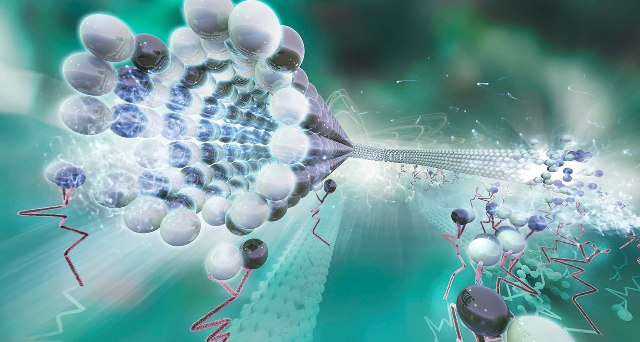Jan 27 2015
As nanomachine design rapidly advances, researchers are moving from wondering if the nanomachine works to how long it will work. This is an especially important question as there are so many potential applications, for instance, for medical uses, including drug delivery, early diagnosis, disease monitoring, instrumentation, and surgery.
In a new study led by Henry Hess, associate professor of biomedical engineering at Columbia Engineering, researchers observed a molecular shuttle powered by kinesin motor proteins and found it to degrade when operating, marking the first time, they say, that degradation has been studied in detail in an active, autonomous nanomachine.
 Molecular shuttles are a nanoscale transport system in which microtubules (acting as cargo carriers) are propelled by surface-adhered kinesin motor proteins. Researchers have found that as the microtubules are propelled by the kinesin motors, tubulin subunits are removed from the leading end. Credit: Coneyl Jayasinhe for Columbia Engineering
Molecular shuttles are a nanoscale transport system in which microtubules (acting as cargo carriers) are propelled by surface-adhered kinesin motor proteins. Researchers have found that as the microtubules are propelled by the kinesin motors, tubulin subunits are removed from the leading end. Credit: Coneyl Jayasinhe for Columbia Engineering
“Our nanoshuttle degraded just like a car that falls apart after a few hundred thousand miles of driving—except that, for our molecular shuttle, the equivalent to a hundred thousand miles turns out to be a millimeter,” says Hess, who collaborated on the study with his former student Emmanuel Dumont PhD’14, now an Innovation Fellow at Cornell Technion, and Catherine Do, postdoctoral research scientist in the Institute for Cancer Genetics at Columbia University Medical Center. The paper—“Molecular wear of microtubules propelled by surface-adhered kinesins”—is published January 26 in Nature Nanotechnology's Advance Online Publication.
Researchers are already working towards creating artificial muscles and other active materials, and, in order to make useful, practical systems, it is critical that they understand how to make the systems last. “What this means,” Hess explains, “is that as we try to understand the design of biological nanomachines operating inside cells and then as we try to invent new synthetic nanomachines, we have to be mindful of their lifetime and make them either last or make them able to renew themselves.”
Biomolecular systems can undergo a range of active movements at the nanoscale that are enabled by the transduction of chemical energy into mechanical work by polymerization processes and motor proteins. Hess and his team used an in vitro system to study nanoscale movement and its consequences and discovered that the mechanical activity of biomolecular motors causes wear at the molecular scale similar to the wearing out of a running car engine. In humans, biomolecular motors are also responsible for the contraction of muscles and the delivery of packages inside cells, and, to prevent aging and disease, these process have to run smoothly for a lifetime. Biological mechanisms such as the continuous replacement of molecular parts have evolved to prevent the rapid degradation of the body’s nanomachines.
“Our study has shown that wear is an important issue which has to be considered in the design of nanomachines,” Hess adds. “And it’s clear that a better understanding of nanoengineering will help us to better understand aging and degeneration in biological systems.”
This study is supported by the National Science Foundation and facilitated by the Center for Integrated Nanotechnologies at Sandia National Labs, a DOE-supported user facility.
The authors declare no competing financial interests.